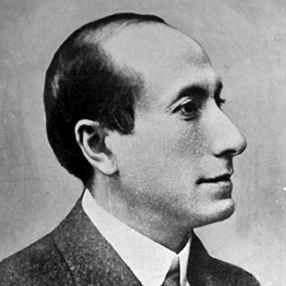To Leonora
translated from the Spanish by Alice Stone Blackwell
Black as the wing of Mystery thine hair,
Dark as a “Never” where deep sorrow lies,
As a farewell, or as the words “Who knows?”
Yet is there something darker still—thine eyes!
Two musing wizards are those eyes of thine;
Sphinxes asleep in shadow in the South;
Two beautiful enigmas, wondrous fair;
Yet is there something fairer still—thy mouth!
Thy mouth! Ah, yes! Thy mouth, divinely formed
For love’s expression and to be love’s goal,
Shaped for love’s warm communion—thy young mouth!
Yet is there something better still—thy soul.
Thy soul, retiring, silent, brimming o’er
With pity and with tenderness, I deem
Deep as the ocean, the unsounded sea;
Yet is there something deeper still—thy dream!
Á Leonor
Tu cabellera es negra como el ala
del misterio; tan negra como un lóbrego
jamás, como un adiós, como un «¡quién sabe!»
Pero hay algo más negro aún: ¡tus ojos!
Tus ojos son dos magos pensativos,
dos esfinges que duermen en la sombra,
dos enigmas muy bellos . . . Pero hay algo,
pero hay algo más bello aún: tu boca.
¡Tu boca! ¡oh, sí!; tu boca, hecha divina-
mente para el amor, para la cálida
comunión del amor, tu boca joven;
pero hay algo mejor aún: ¡tu alma!
Tu alma recogida, silenciosa,
de piedades tan hondas como el piélago,
de ternuras tan hondas . . .
Pero hay algo,
pero hay algo más hondo aún: ¡tu ensueño!
This poem is in the public domain. Published in Poem-a-Day on September 17, 2023, by the Academy of American Poets.
Alice Stone Blackwell’s English translation of “To Leonora” first appeared in La Revista Mexicana, vol. 3, no. 7 (October 1919). It was later collected in her book of Spanish translations, Some Spanish-American Poets (D. Appleton and Company, 1929). The Spanish original appears in Amado Nervo’s collection En voz baja (Sociedad de Ediciones Literarias y Artísticas Librería Paul Ollendorff, 1909). In Studies in Spanish-American Literature (Brentano’s Publishers, 1920), writer, biographer, and translator Isaac Goldberg writes, “Much of [Amado Nervo’s] poetry possesses an ineffable tenderness, especially such as appears in the first part of his collection called En Voz Baja [In a Soft Voice]. Not only are the thoughts such as may be spoken only in a soft, sweet voice, but the very hush of passionate confiding, the soft breath of airy wishes, the deep sense of holy silences, the poignant, haunting memories of a past suddenly evoked, rise like incense from its pages. Nervo, in some of his aspects, possesses a lyric introspection that seems, by some fourth-dimensional gift of thought, to penetrate into lives we only half dream of living; he feels the feverish hurly-burly of modern life, yet is a man of his times and has faith in his age. His comparisons are not only things of beauty, but conveyors of beauty as well. He is not the empty, if beautiful urn of so many Parnassians; he can fashion beautiful urns and fill them with intoxicating wine.” John E. Englekirk, former professor of Spanish and Portuguese at the University of California, Los Angeles, in Edgar Allan Poe in Hispanic Literature (Instituto de las Españas en los Estados Unidos, 1934), remarks of the poem that “[t]he very title of ‘A Leonor’ arouses one’s suspicions as to the probable source of the poem. Nervo’s allusion to ‘The Raven’ is inescapable. His line ‘Tu cabellera es negra como el ala / del misterio;’ is but a paraphrase of ‘blacker than the raven wings of midnight!’”

